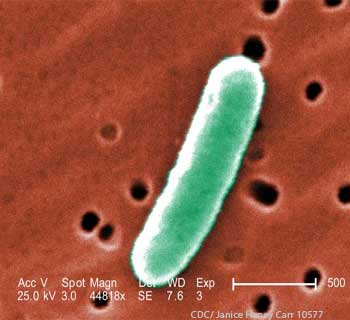Updated September 27 with the final case total A Shiga toxin-producing E. coli outbreak at the University of Arkansas has ended after sickening 42 people, according to a statement by the university’s health center. Four people were hospitalized.
Students were notified in an August 24 email that an E. coli outbreak had begun about one week prior and that several students had been hospitalized.
More than 3,200 people completed health surveys from the Arkansas Department of Health (ADH). At least 100 people reported experiencing abdominal cramps and diarrhea, symptoms of an E. coli infection, Dr. Naveen Patil, ADH Deputy State Health Officier said. Five cases were confirmed through laboratory testing and 37 cases were probable. All of the illnesses occurred on the Fayetteville campus.
Results of tests on food samples did not identify the food source of the outbreak, but health officials said there was no evidence linking the outbreak to the University’s dining facilities.
Any food can be contaminated with E. coli and cause illness if eaten raw or improperly cooked. The most common sources of E. coli outbreaks are leafy greens and ground beef.
Do You Need an E. coli Lawyer?
Shiga Toxin-Producing E. coli and HUS Symptoms
Symptoms of an E. coli infection, which include fever, abdominal cramps, and diarrhea that is sometimes bloody, usually develop within one to three days of exposure.
Some strains of E. coli, including E. coli O157:H7, produce Shiga toxins that are poisonous to humans and cause severe illness including hemolytic uremic syndrome (HUS), a form of kidney failure.
Over-the-counter anti-diarrheal medications and antibiotics should not be given to patients with E. coli infections as they can increase the chance of developing HUS.
Symptoms of HUS usually develop a week after initial E. coli symptoms. HUS can be fatal. Anyone with HUS symptoms should seek immediate emergency health care.
HUS symptoms include:
- Pale skin
- Unexplained bruising
- Bloody diarrhea
- Decreased urination
- Extreme fatigue
- Shortness of breath
- Swelling in legs, feet, or ankles

Experienced E. coli Lawyers
If you or your child developed an E. coli infection from contaminated food at the University of Arkansas and would like a free consultation with an experienced E. coli lawyer, please contact our E. coli Legal Team. We have represented clients in every major E. coli outbreak in the U.S. You can reach us by calling 1-888-377-8900, sending a text to 612-261-0856, or by completing the form below. The consultation is free and there is no obligation.